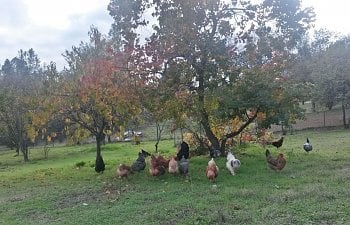There really could not have been a worse scenario for the first death we experienced in our backyard flock. Prior to owning chickens, I had read and understood the risks – the fact that just about everything eats chicken, that predators fall from the sky, come creeping out from behind every bush, and wag their gleeful tails while moments later wreaking carnage on beloved hens. I also knew, at some point, even I would be eating the birds I raised by hand. I’m an educator – I taught the food chain.
It was a beautiful spring day and a beloved friend and chicken lover had come to see our new birds. We went into the coop together, and were being swarmed by the “we know you have a treat for us” gang, when suddenly my dogs pushed through the partially closed gate and dove after the first birds they could get their maws on! I was terrified and ran to rescue one small pullet, already under the paws of my normally docile pup, somehow snatching her from a certain death. Then, between my friend and I, we managed to wrangle and drag both dogs out of the pen. It all happen so quickly! When I turned back to survey the damage, I felt that sickening realisation that all chicken owners have felt, or will feel at some point - one of our little pullets was dead. And, worse than that - it wasn't the dogs that had killed it. In all the chaos and confusion, I had stepped on it. It was me - I was responsible for the first death in my flock.
As time has passed, we have lost other birds (hawks seem to be the nemesis of choice on our little farm, although we also have a marauding mountain lion that got one of our goats), and each time, we grieve. Granted, we don't grieve as much, as we have accustomed ourselves to the fact that loss is indeed, part of the poultry owner's lot in life.
So, how do we respond to this inevitable attrition of our flocks? I have witnessed a wide variety of responses, from friends who have a relatively high predator quotient and view their free ranging flock as purely an egg and meat commodity (we jokingly say that their farm is the place chickens go to die), to others who keep their birds so tightly confined in fear of loss, that it takes an IQ higher than mine simply to open the gate! There are also those of us who refuse to even name a bird, because predators just "sense" the affection on that hen (I am convinced 'love' must have a particular scent!) and inevitably choose that girl for their dinner.
After our most recent loss (Hawk! Grrr), my teenaged daughter made the suggestion that we should leave the chickens in their coops from now on. She reasoned, and logically so, that they would be safer and that she wouldn't have to go through this grieving process again. (She really loves our birds, no matter how much I try to turn her into a pragmatic farm girl.) It wouldn't be a terrible thing to coop them up. She had a point.
However, our loss rate has never been terribly high during the day; and, although it does hurt to lose one, our chickens love to be out grazing. They, quite literally, "yell" at us in the morning to be let out. So, we continue to send them to pasture, knowing the possibilities. We do our best to protect them (roosters, lots of places to hide, etc.), but ultimately know today might be someone's last. And, if it is their last, let's think about their quality of life.
The BYC website is proof positive that "backyarders" tend to take great care of their chickens. We dutifully practice biosecurity, clean coops, change feed and water, watch for signs of illness, monitor social interactions and behaviors, dole out treats, and yes, even have full-blown conversations with our birds. Say what you want, all of these are the very expressions of the love we have for our social critters out back. It will always hurt, in some way or another, to lose one. But here, my friends, is the silver lining on the cloud of grief - your flock is loved; every day they spend in your yard is a gift - better than a thousand in a cage or a factory. Take comfort in that fact; and don't hesitate to tell them they are loved - today may be a "last day" for one of them, but it should, at least, be a good one.

